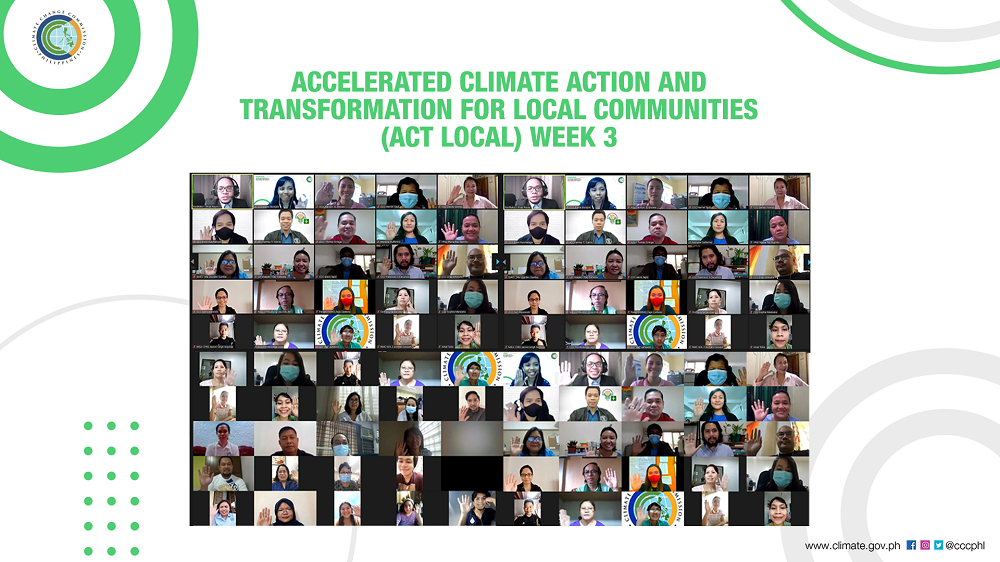
October 28, 2020 Wednesday

MANILA, 29 October 2020 — In the third session of the “Accelerated Climate Action and Transformation (ACT) Local Online Conference,” the Climate Change Commission (CCC) stressed the importance of climate risk management, greenhouse gas (GHG) emissions inventory, and climate budget tagging as critical components of local climate planning and action.
A four-part online webinar series organized by the CCC, the ACT Local Conference aims to capacitate higher education institutions (HEIs) from across the Philippine regions to provide technical assistance on climate science, issues, vulnerabilities, and risks to their respective local government units (LGUs) and communities, with the view of developming science-based and risk-informed local climate plans.
The HEIs who participated in the webinar are the following: Aklan State University, Ateneo de Davao – Law, Bulacan State University, Holy Name University, Iloilo Science and Technology University, Laguna State Polytechnic University, Leyte Normal University, Mariano Marcos State University, Mindanao State University- College of Forestry and Environment, Rizal Memorial Colleges – School of Law Davao, Southern Philippines Agribusiness and Marine and Aquatic School of Technology, St. Michael’s College- Laguna, Sultan Kudarat State University, University of Antique, University of the Philippines Visayas, and West Visayas State University.
CCC Assistant Secretary Romell Antonio O. Cuenca recognized the role of HEIs in building the capacities of our LGUs, particularly in providing assistance in crafting science-based and risk-informed Local Climate Change Action Plans (LCCAPs).
“Through today’s session, we hope to provide a strategy for you and your respective LGUs to develop a basis for climate mitigation efforts through the greenhouse gas inventory, and through the CCET presentation, and of course, discuss how the national and local government can work together to ensure we have sufficient funding for necessary climate actions,” said Cuenca.
Ms. Elaine Joyce V. Borejon of the CCC’s Policy Research and Development Division discussed the National Climate Risk Management Framework (NCRMF), a policy initiative of the CCC that envisions a climate action planning system that is anchored on a unified and integrated science and risk-based approach through the presence of a strong risk database, information, and analytics system accessible at the national and subnational levels.
“We really look forward to enjoining you in [the NCRMF] process. Higher education institutions are very crucial in this, so we want sustained partnerships [with you] towards our country’s transformation,” said Borejon.
Mr. Francisco S. Dacumos III of the CCC’s Implementation Oversight Division discussed how LGUs could account and monitor their GHG emissions and climate-related expenditures.
A GHG inventory is an estimate of all emissions and removals of GHG from given sources and sinks within a defined spatial and temporal dimensions, while the CCET mandates government agencies to track their climate change expenditures in their respective budget submissions using a common framework jointly issued by the CCC and the Department of Budget and Management (DBM) to monitor the implementation of the NCCAP at the community level.
“GHG inventory aids in identifying source sectors and activities contributing to GHG emissions, as well as understanding trends in emissions and removals alike. It serves several purposes in terms of policymaking, and strategic and investment planning, as it provides scientific bases upon which emissions reduction strategies and policies shall be constructed. The CCET meanwhile provides information on which sectors national and local governments focus their resources on, and what general or specific actions they are undertaking. Through this, financing gaps and deficient sectors which require attention in terms of financing and urgency are identified,” said Dacumos.
The ACT Local Online Conference aims to formalize a sustainable partnership between the national government, academe, and the private sector in providing technical and/or financial resources to LGUs on climate action. Through this, relevant stakeholders will be capacitated to assist and contribute to efforts that will generate information, boost capacity development, promote cooperation and convergence, facilitate vertical and horizontal alignment for development planning, and access to climate financing windows towards climate resiliency.
The last leg of the online webinar, airing on October 27th, will focus on the process of accessing the People’s Survival Fund (PSF) and developing PSF proposals.
Interested participants may register through this link: https://www.eventbrite.
For more information about the ACT Local Online Conference and ACT Local Program, visit the Facebook page of the Climate Change Commission at www.facebook.com/CCCPhl.